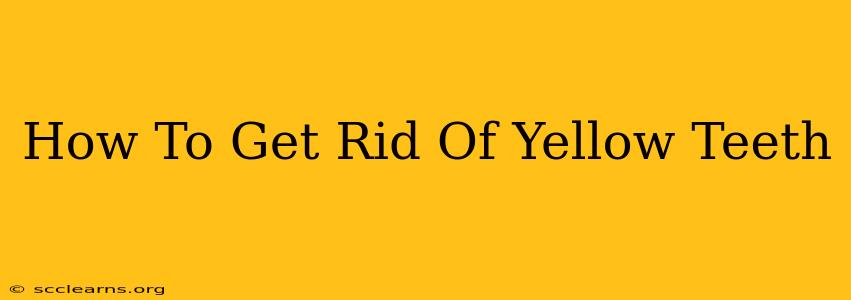Having bright, white teeth is a common desire. Yellow teeth, however, can be a source of insecurity for many. Fortunately, there are numerous ways to tackle yellowing and achieve a whiter smile. This comprehensive guide explores effective methods, from simple at-home remedies to professional treatments.
Understanding Why Teeth Yellow
Before diving into solutions, let's understand the root causes of yellow teeth. Several factors contribute to discoloration:
- Age: As we age, the outer enamel layer thins, revealing the dentin beneath, which is naturally yellowish.
- Diet: Consuming highly pigmented foods and drinks like coffee, tea, red wine, and berries can stain teeth over time.
- Smoking: Nicotine and tar in cigarettes are notorious for staining teeth yellow, and even brown.
- Poor Oral Hygiene: Insufficient brushing and flossing allows plaque and tartar buildup, leading to discoloration.
- Certain Medications: Some medications can cause discoloration as a side effect.
- Genetics: Thinner enamel or naturally darker dentin can make teeth appear yellower.
Effective Ways to Whiten Your Teeth
Now, let's delve into practical solutions to address yellow teeth. The best approach depends on the severity of discoloration and your personal preferences.
At-Home Whitening Methods:
- Brushing Regularly: This is the cornerstone of oral hygiene. Brush twice daily with fluoride toothpaste for at least two minutes each time. Proper brushing technique is crucial.
- Flossing Daily: Flossing removes food particles and plaque from between your teeth, preventing discoloration and gum disease.
- Using Whitening Toothpastes: These pastes contain mild abrasives that gently remove surface stains. Look for pastes containing ingredients like baking soda or hydrogen peroxide. Note: These are less effective for deep stains.
- Oil Pulling: Swishing oil (like coconut oil) in your mouth for a few minutes daily is an ancient remedy claimed to improve oral hygiene and whiten teeth. However, scientific evidence is limited.
- Baking Soda Paste: A paste of baking soda and water can gently scrub away surface stains. Use sparingly as overuse can damage enamel.
- Hydrogen Peroxide Rinse: Diluted hydrogen peroxide can help lighten teeth. Caution: Use a low concentration (3%) and avoid swallowing. Overuse can irritate gums.
- Over-the-Counter Whitening Strips and Trays: These are readily available and offer a convenient way to whiten teeth at home. They usually contain bleaching agents like hydrogen peroxide or carbamide peroxide. Follow instructions carefully.
Professional Whitening Treatments:
If at-home methods aren't sufficient, consider professional treatments for more dramatic results:
- In-Office Whitening: A dentist applies a high-concentration bleaching gel to your teeth, often using a light to accelerate the process. This provides the quickest and most noticeable results.
- Custom-Fit Whitening Trays: Your dentist creates trays tailored to your teeth, allowing you to use a bleaching gel at home under their supervision. This offers a more controlled and comfortable experience than over-the-counter trays.
- Veneers or Crowns: For severe discoloration or damage, veneers or crowns can completely cover the teeth, giving you a dramatically whiter smile.
Maintaining Your Whiter Smile:
Once you've achieved your desired whiteness, maintaining it requires ongoing effort:
- Continue good oral hygiene practices.
- Limit consumption of staining foods and drinks.
- Use a straw when drinking pigmented beverages.
- Consider touch-up whitening treatments as needed.
Choosing the Right Method for You
The best way to get rid of yellow teeth depends on your individual needs and preferences. Consult your dentist to discuss your options and determine the most effective and safe approach for your specific situation. They can assess the cause of your yellowing and recommend the best treatment. They can also help you avoid damaging your enamel through improper whitening techniques. A healthy smile is a beautiful smile!

